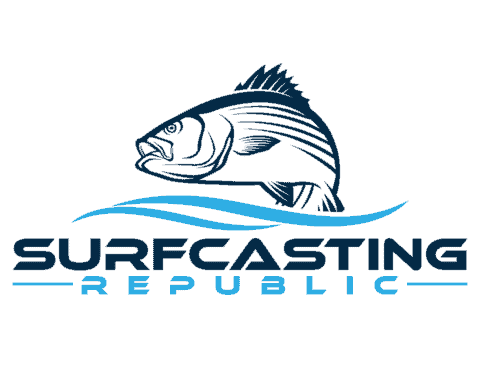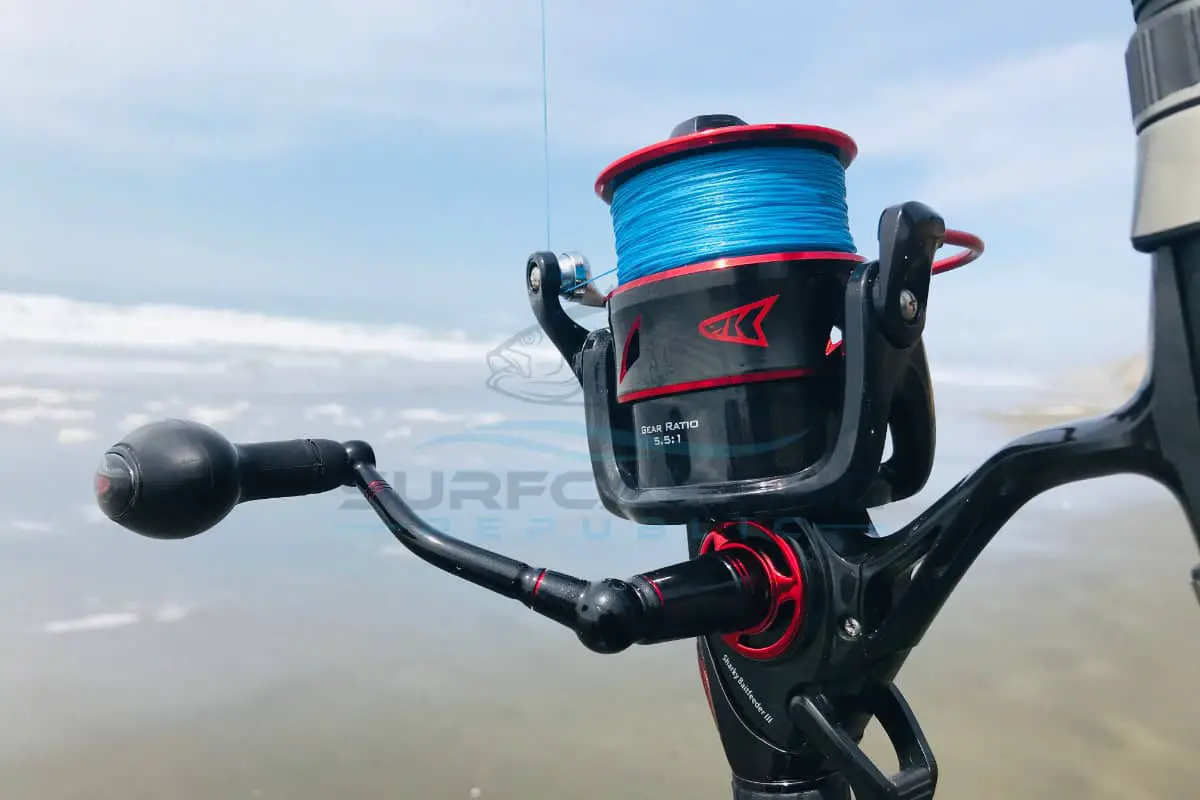Surf fishing is often a challenge and is especially hard on gear and tackle with its saltwater conditions. Many of the fish that you catch in the ocean are also much larger and stronger to reel in, making it even more of a challenge. This all means that your gear and tackle of choice must be up to the job!
You should be using a braided fishing line for surf fishing for many reasons, such as its strength and lack of stretch. Braided fishing line is very thin, durable, and can tie and hold very strong knots. The braided fishing line offers many different advantages over other types of fishing lines.
One of the most important pieces of equipment that have a lot of influence on your success rate is your fishing line.
The line that you end up choosing will have to withstand tough conditions when compared to other types of fishing.
A good saltwater fishing line should be not only pretty tough and durable but also light enough to cast it out far enough into the surf.
There are so many different options of fishing lines out on the market, so how do you know what is best for surf fishing? What type of line is the best?
We are going to break down some of the best picks for surf fishing and ensure that you are going out more prepared than ever on your next fishing trip!
Is Braided Line the Best for Surf Fishing?
Braided fishing line![]() is considered one of the top choices for most surf fishing situations by many experienced anglers.
is considered one of the top choices for most surf fishing situations by many experienced anglers.
But why is that? What does the braided fishing line have over other types of lines?
To understand all of that, we must first take a minute and talk about what exactly is braided fishing line.
Braided fishing line![]() was one of the first types of fishing line and has been used for quite some time.
was one of the first types of fishing line and has been used for quite some time.
Our modern braided line is still one of the most preferred types of lines because of its lack of stretchiness, its ability to tie and hold solid knots, and its overall power and strength compared to its size.
Back in the day, the braids were made from natural fibers like cotton or fabric, but these days our lines are braided with modern and strong materials like spectra, Dacron, or micro-Dyneema.
Braided fishing lines are super tough, and because of the multiple fibers braided together, can withstand sharp objects and abrasion much better than other types of fishing lines.
This is perfect for surf fishing, as you never know what might be under the water in the ocean.
From sharp rocks and reefs to fish’s teeth, there is always something that might risk cutting your fishing line, and you want to ensure that you have the most reliable line possible.
It also helps fight and pull in the larger fish that you pursue in the saltwater, as getting some of the fish into you could be a challenge with stretchy or weak fishing lines.
What are the Advantages of Braided Line?
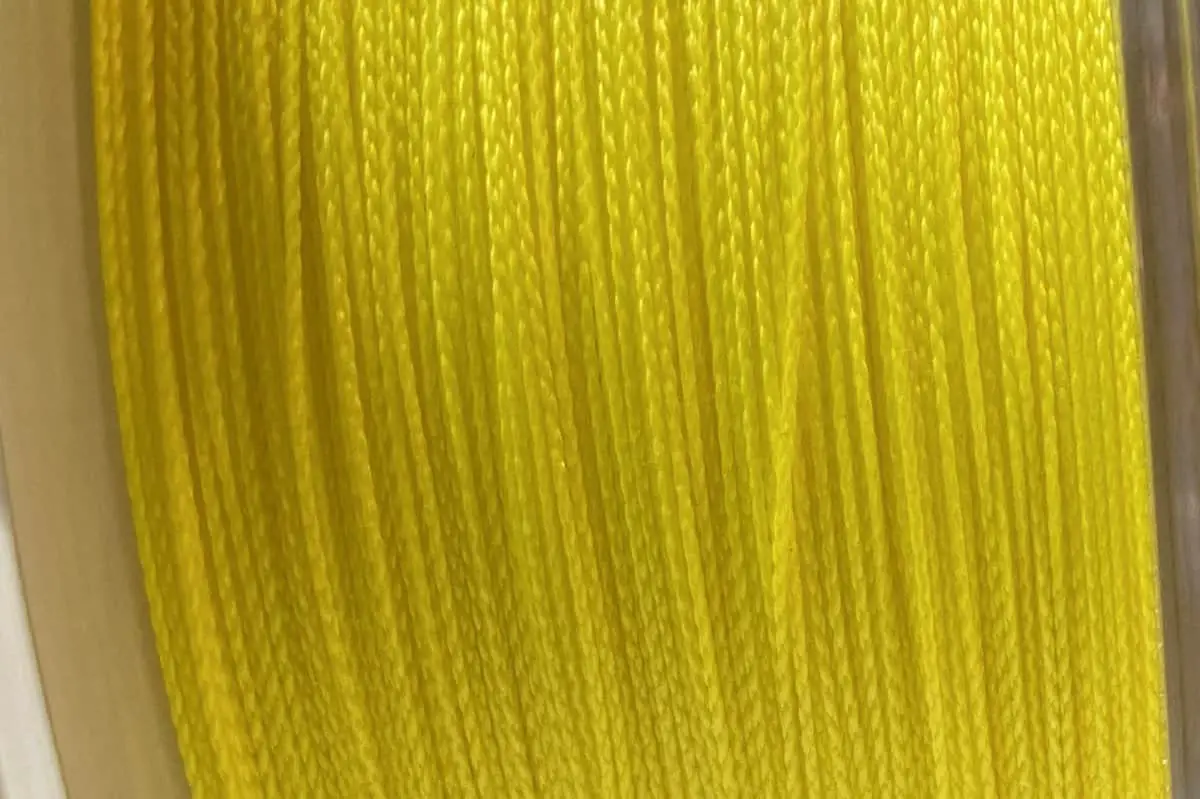
As we mentioned, the braided fishing line has many advantages to it. It has very little to no stretch in it, meaning that fish cannot put their weight on a line and stretch it out.
Fishing lines that stretch are not ideal for most fishing situations, especially surf fishing.
Braided fishing line![]() is also very resistant to abrasion, which you will find a lot of with surf fishing.
is also very resistant to abrasion, which you will find a lot of with surf fishing.
Some fish have plenty of sharp teeth and fins that can easily slice or cut a fishing line, but braided line does a much better job at resisting this.
Your braided fishing line will easily outperform and outlast your mono fishing line!
Next, we have overall strength of braided lines.
Braided fishing line has the best strength to size ratio of any other fishing line, and it is not uncommon to see braided lines that are twice as strong (but the same diameter) of other lines.
This helps your overall fishing rig have more power, but it also helps reduce the physical weight of your fishing rod.
Braided fishing line also floats. While some anglers might think this be a negative thing, it can help you in certain situations.
If you love to use a lot of topwater baits, then a floating, braided line can make this so much easier.
Lastly, braided fishing lines are just flat out strong. They don’t lose any of this strength once they get wet, as other types of fishing lines tend to do.
This makes them ideal for big fish and tough locations. If you find yourself fishing in areas with a lot of vegetation or rocks, a braided line will help you to keep a fish on the line when a mono line would otherwise break.
What are the Disadvantages of Braided Line?
Now we know that braided fishing line![]() has plenty of advantages to it, are there any disadvantages? Unfortunately, there are a few, as everything has to have both pros and cons.
has plenty of advantages to it, are there any disadvantages? Unfortunately, there are a few, as everything has to have both pros and cons.
When thinking about using a braided fishing line while surf fishing, you will have to take a few of these into consideration.
The first disadvantage is that tying knots with braided lines can be a little bit tougher than other types of lines.
Braided fishing lines, especially when they get wet, can be very slippery.
As most anglers know, tying a good knot is one of the most important things you can do to land a fish successfully.
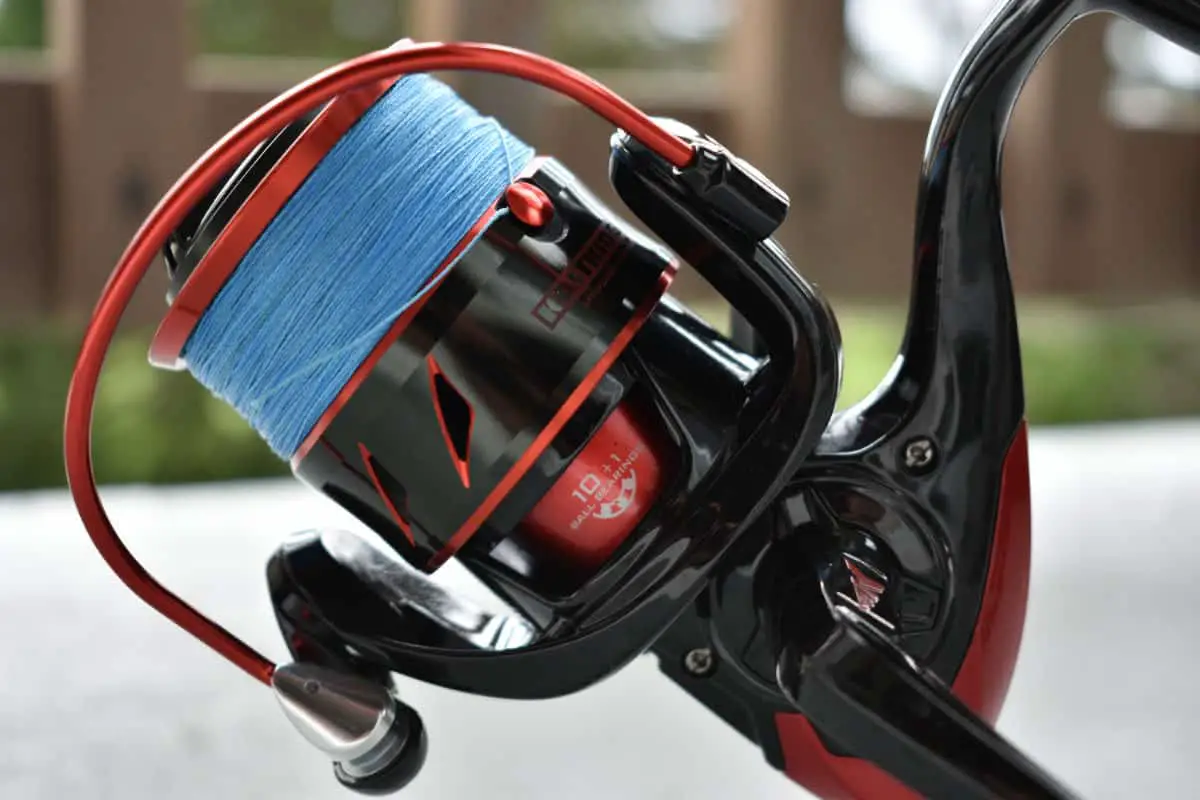
The last thing you want is your knot to come loose or to break because you improperly tied it.
Some anglers will go as far as using a small drop of superglue on a braided fishing line knot to ensure that it does not fail.
Another possible disadvantage to braided fishing lines is that they are much more visible than other lines.
Fish can see just about anything they need to in the water, including a braided line.
Many anglers will avoid using a braided line in clear waters for exactly this reason. If the fish can see your line, the chances are that they will be biting much less.
In addition to being much more visible, braided fishing lines can also be much harder to cut and maneuver.
While a simple pair of clippers may work just fine on a monofilament line, they generally do not work very well with a braid.
Most anglers will carry a full pair of scissors in order to cleanly and effectively cut braided lines, as anything else usually will not cut it.
Next, we have a slightly unusual feature of braided lines![]() , called “singing.” This means that when you are reeling in your braided line, it will produce a sound.
, called “singing.” This means that when you are reeling in your braided line, it will produce a sound.
You really want your fishing line to be as quiet as possible, especially when pursuing finicky fish that can potentially be spooked off.
While this sound might not be a big deal to most anglers, it can be a big downside to others.
We have already mentioned just how tough braided fishing line is, but this could actually be considered a disadvantage as well.
This is because braided lines will wear out your fishing gear, particularly your rod guides, much faster than other lines because of how tough it is.
This will force you to upgrade and replace your gear more often, and you should make sure that the gear you intend to use with braided line is up for the job!
Finally, we have another advantage that could turn into a disadvantage.
Braided fishing line has virtually no stretch to it, which could be a good thing. This could also be a bad thing.
If a line has no stretch, a fish could potentially rip the hook out of its mouth if the drag is not properly set.
If the hook is set too hard and it is a big enough fish, you also could run the risk of the actual fishing rod breaking if the fish makes a hard run.
Benefits of Braided Line for Surf Fishing
As you can see, there are plenty of advantages and disadvantages to using a braided fishing line.
It is up to you to decide if a braided fishing line ![]() is a right tool for the job in your situation, especially after weighing out all of the pros and cons.
is a right tool for the job in your situation, especially after weighing out all of the pros and cons.
Most anglers who go surf fishing, however, opt for the braided line as they believe that the advantages outweigh many (if not all) of the possible disadvantages that this type of line might have.
More and more anglers are opting for braided fishing lines as they go to line as not only is the braided line on the market getting better and better.
But it provides plenty of strength, sensitivity, and durability to fish and catch virtually any type of fish you might need.
While it may not be perfect for every situation, many anglers choose this type of line depending on their needs and preferences to help them successfully catch much more fish.
When to Use Braided Line for Surf Fishing?
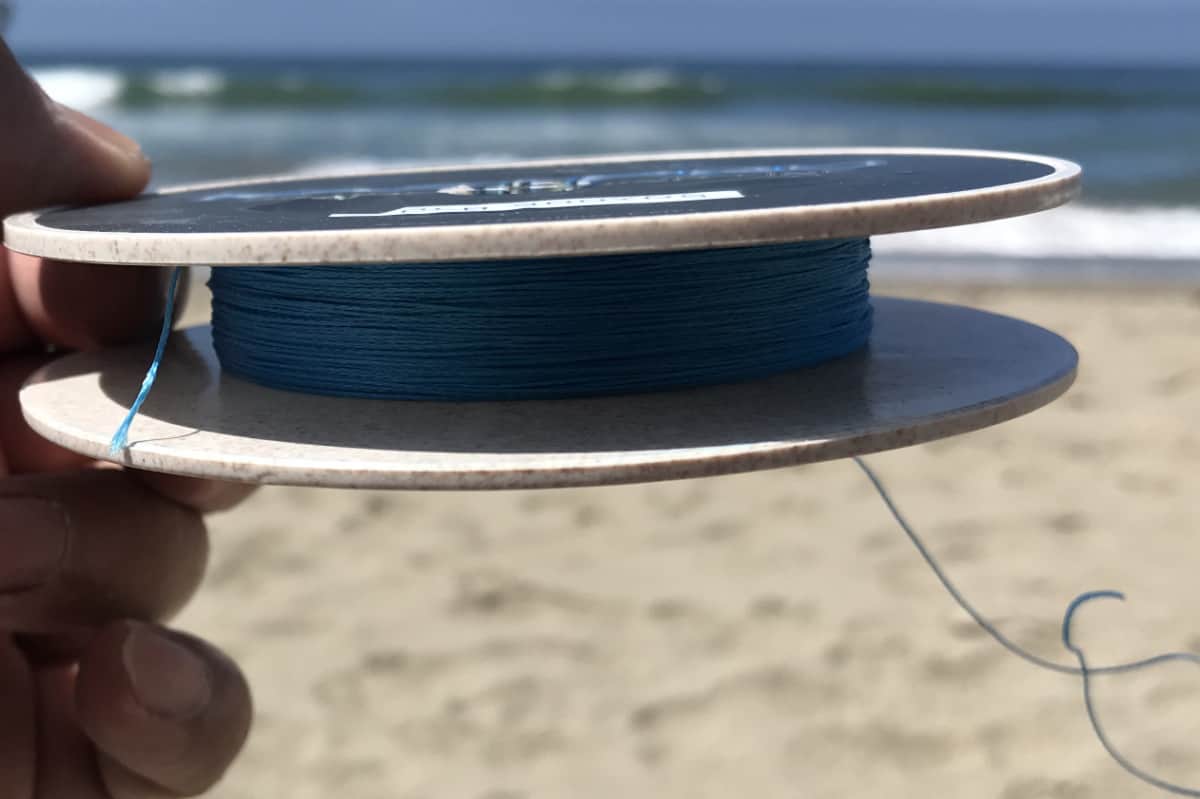
There are a few notable situations that you will definitely want to employ some braided fishing line![]() when you go out surf fishing.
when you go out surf fishing.
While every situation and area is different, keep in mind that the type of equipment and gear that you choose is a personal choice and there are never any right or wrong answers!
If you think that you are going to be doing some long casts and need to cover some distance, then a braided line is a great choice.
Because it is smaller in diameter, you can equip a lot more of it on your spool in order to cover those long-distance casts.
And because it has no stretch, even at long distances, you will have plenty of sensitivity in order to feel every single bite or nibble on the other end of your line.
Another good situation that would be great for braided lines is if you are planning on fishing around any type of structure, rocks, or vegetation.
Many types of fish are very smart, and once hooked, will head for the nearest thing that they can use in order to rub and cut off a line.
Using a braided fishing line will help combat this and keep more fish at the end of your line!
Lastly, if you love having good sensitivity and bite detection (no matter where or what you are fishing), then a braided line should be your number one pick.
Because of its lack of stretch, it gives you much more sensitivity than other types of lines.
This can be especially important in choppy water conditions or unusual weather, where detecting a bit might be much more difficult than it usually is.
When Not to Use Braided Line for Surf Fishing?
Using braided lines is probably the best thing you can do when going surf fishing, but there are a few different instances where you might not want to use it.
One of these will be if you are a beginner to braided lines in general.
Braid has more of a learning curve than other types of line, and you should try to get a little bit of practice in casting it and catching smaller types of fish before heading out and fighting the surf with some braided fishing line!
You will also not want to use braided fishing lines in crystal clear waters.
Because braided fishing lines are much more visible, fish are much more likely to see them and stay clear of them.
This can obviously be a problem when you want them to bite your bait or lure at the end of the line. How do you catch a fish that won’t come near it?
Should I Use Braided Line for Surf Fishing and Swimbaits?
Yes, using braid for swimbaits is a great idea for surf fishing. Braided line offers greater sensitivity and strength compared to monofilament, making it ideal for casting long distances and feeling subtle bites. The thin diameter of braid also allows for better lure action, perfect for enticing strikes from saltwater predators.
What Pound of Braided Line is best for Surf Fishing?
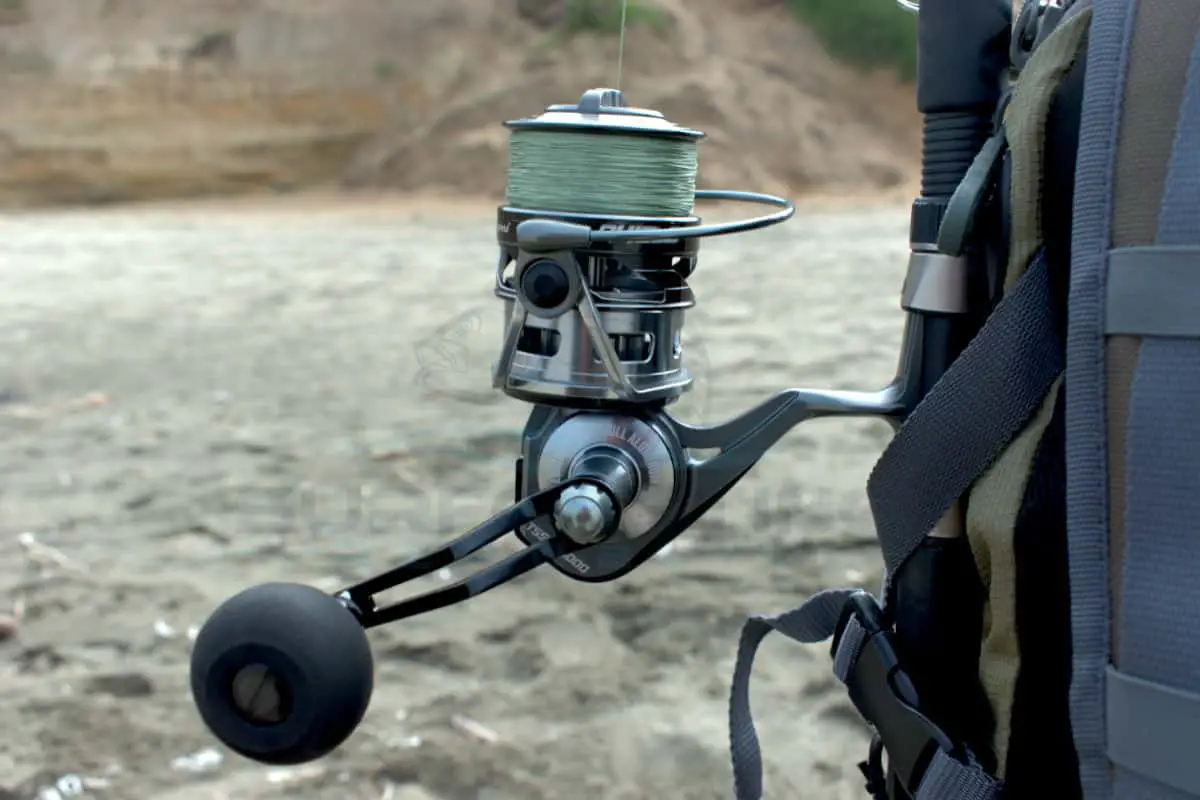
The strength and pound test of your braided fishing line is going to be one of the most important decisions you make when going out surf fishing.
Your line could easily be considered the most important piece of gear that you have, as it is what connects you to the fish.
If your line fails, you simply will not catch the fish. So, as an angler, it is your job to make sure that you have the right tools for the job!
Before ever heading to the ocean to go fishing, you should consider what type of fish and how big of fish you are expecting to catch.
This will help in your decision of what pound test of a line that you should be using.
You won’t want to use a 6 lb test line if you are expecting to catch 10 to 20-pound fish, as they could possibly snap your line no matter how strong it might be.
With all of that being said, many anglers who prefer surf fishing tend to use a 15-20 lb test when they are using a monofilament or fluorocarbon line, and up to 30-40 lb test when they are using braided line.
This is not, however, the size that everyone else should be using! Again, think about your intended species of fish, the size and poundage of them, weather conditions, water conditions, casting distance, and your rod and reel.
Put all of these factors into effect and choose a braided fishing line that will be the right fit for the job!
Final Thoughts
Braided fishing line has come a long way, and continues to be one of the most popular fishing lines in the world.
Because of its superior strength, lack of stretch, and small size, it is easy to see why it is a popular choice amongst anglers who go surf fishing.
If you have never tried a braided line![]() while surf fishing, you owe it to yourself to try it out and see what you might have been missing this entire time!
while surf fishing, you owe it to yourself to try it out and see what you might have been missing this entire time!
